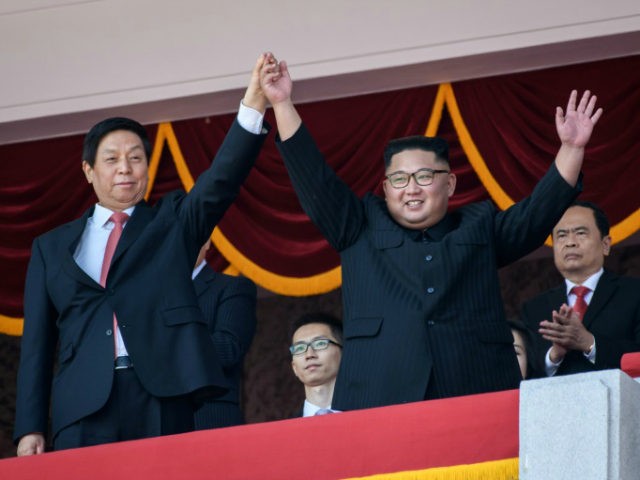North Korea held a significantly toned-down parade on Sunday for the 70th anniversary of its founding; it lacked the usual display of nuclear-capable weapons but prominently featured China’s special envoy to the country, representing communist leader Xi Jinping.
Beside dictator Kim Jong-un, who presided over the Pyongyang event but did not deliver a speech, sat Li Zhanshu, the chairman of China’s National People’s Congress, He was next to him for the parade and granted him an exclusive personal meeting, where Li reportedly delivered a personal letter from Xi Jinping. According to Chinese state news agency Xinhua, Xi told Kim in his letter that “it is an unswerving policy of the CPC [Communist Party of China] and the Chinese government to safeguard, consolidate and develop China-DPRK relations.”
The South Korean newspaper Chosun Ilbo quoted an unnamed “diplomatic source” naming China as one of North Korea’s main allies that discouraged a display of intercontinental ballistic missiles (ICBMs) at the parade, which North Korea claims can reach the U.S. mainland.
“North Korea’s allies, such as China, Russia, Cuba and Syria that dispatched senior envoys, would have been embarrassed if ICBMs had been displayed,” the source claims.
Yonhap, a South Korean news agency, notes that in the last military parade in February, the North Korean military featured the Hwasong-15, an ICBM Kim claimed could hit any part of the continental United States and featured more belligerent military statements. In contrast, “Sunday’s event also put less emphasis on tanks, missiles and soldiers than on civilian groups, such as nurses and construction workers.”
China received prominent billing during the event. Li was not only graced with a prime seat at the festivities but with a personal greeting from Kim Yo-jong, Kim Jong-un’s sister and believed to be the head of North Korea’s Propaganda and Agitation agency, which controls all publications and broadcasts in the country. “The last time she was seen out and about was three months ago during the U.S.-North Korea summit in Singapore in June,” Chosun Ilbo noted.
The Korean Central News Agency (KCNA), a state-run news service, gave prominent coverage to Li’s meeting with Kim afterward.
“Supreme Leader Kim Jong Un … gladly met with Li Zhanshu and other delegation members on a visit to the DPRK to attend the celebrations for the 70th birthday of the DPRK, and posed for a photo with them before having a cordial talk with them,” KCNA reported. “Li Zhanshu courteously handed over the personal letter of Xi Jinping to Kim Jong Un.”
Kim reportedly declared China “most trustworthy neighbor” and called it a “natural obligation” of North Koreans to be hospitable to the Chinese.
Kim reportedly added:
The visit to the DPRK by Li Zhanshu, who is special envoy of Xi Jinping, at a time when the Korean people greet the greatest national holiday with great joy and pride will be an important occasion to demonstrate once again the invincible DPRK-China friendship developing favorably day by day in the new situation.
The Global Times, a prominent Chinese state newspaper, praised North Korea for giving Li a warm welcome and declared that the exchange “further demonstrates the intensity of high-level exchanges between the two countries.” Unlike North Korean propaganda outlets, which kept themselves to praising China, the Global Times took the opportunity to attack the nations pressuring North Korea to abandon its nuclear weapons program.
“There is something wrong with the way countries such as US, South Korea and Japan view China-North Korea relations,” the Global Times claimed, adding:
They only care about the North Korean nuclear crisis while ignoring the significance of bilateral relations to both countries. They hope the closeness of the bilateral relations will enable Beijing to influence Pyongyang’s nuclear stance. They also hope for setbacks in bilateral relations for geopolitical reasons.
China’s prominent place in an ostensibly patriotic display for North Korea follows complaints from Washington that Beijing is helping North Korea avoid the consequences of unprecedentedly severe global sanctions. China has long been North Korea’s closest ally and largest trading partner, with the most to lose from preventing businessmen on the border from engaging with the fellow rogue state.
In July, reports suggested that China had opened a travel agency in Taiwan to help bring tourism into North Korea. Last week, experts noted that reports from the North Korea-China border indicate that merchants are being allowed with almost no restraint to engage in black market trading with North Korea, including trade in banned items such as coal, not just tourism or trade in basic necessary goods.

COMMENTS
Please let us know if you're having issues with commenting.